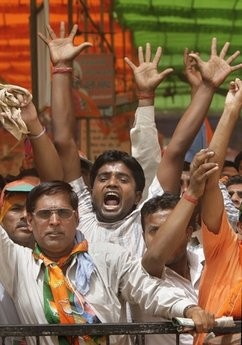Nationwide strikes over food prices and a protest vote in parliament heaped more pressure on India's government Tuesday, which is fighting scandals on several fronts.

The Congress-led government has endured a torrid few weeks after an IPL cricket controversy that forced the resignation of a minister and a magazine report about the alleged phone-tapping of senior opposition politicians.
On Tuesday, anger over food prices -- up nearly 20 percent over 12 months -- saw buses burnt in the northern city of Lucknow, protests in southern Hyderabad and a mass strike in the eastern communist-run city of Kolkata.
In the capital New Delhi, members of the opposition parties behind the protests staged a sit-in on the steps of parliament with posters saying "Control Back-Breaking Price Rises."
"The agitation is a warning to the federal government. The government must take all necessary steps to bring down the price of essential commodities," All India Trade Union Congress (AITUC) leader Gurudas Das Gupta told AFP.
A no-confidence vote in parliament on the issue of unpopular fuel price hikes, organised by the parties behind the protests, was expected to fail with the government seen as having sufficient support.
"Let us see what happens... people are protesting outside and inside the parliament," a senior leader from the opposition Hindu nationalist Bharatiya Janata Party, Venkaiah Naidu, told reporters when asked about the vote.
"This is a good occasion for us to test the government's ability -- there is a controversy surrounding the IPL, price rise, phone tapping. The government has to answer to all of this."
In a move repeated regularly over the last weeks, the opposition forced the adjournment of parliament again on Tuesday as angry MPs leapt to their feet and shouted over speakers.
The cricket and phone-tapping scandals have distracted the government at a crucial time as it looks to pass important new legislation, including a national budget.
They have also sapped its momentum less than a year after Congress was returned to power in national elections that were seen as giving it a strong mandate to push through economic liberalisation and welfare reform.
There was uproar on Monday over the phone-tapping allegations, carried in Outlook magazine last week, though Home Minister P. Chidamabaram has denied that the government eavesdropped on its rivals.
There were sporadic protests across India on Tuesday, from Kerala in the south to Arunachal Pradesh in the far northeast, in which demonstrators demanded action on high food prices.
In Kolkata, thousands of airport, rail and bank workers went on a dawn-to-dusk strike, while schools and shops shut and attendance in government offices was extremely low.
Food inflation stood at 17.65 percent over 12 months in the second week of April.
Surging food prices have become a major political issue in India, where complaints about the rising cost of living are common among ordinary people.
A severe drought last year, when the monsoon rains were the weakest in 37 years, hit farmers hard across the country. This has led to reduced crop yields, forcing up prices.







)
















